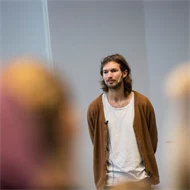Higher education didactics for sustainability
This course is a collaboration between Mid Sweden University, Karlstad University (KAU), Linköping University (LiU), Mälardalen University (MDU), Lund university (LU) and Inland Norway University of Applied Sciences (Inn).
Entry requirements: higher education exam
Level: advanced (second cycle)
Duration: 2 weeks (equivalent to 3 course credits)
Department: Division of Research and Educational Support
Course description revised: 2023-10-02
Aim
The course aims to empower educators, pedagogical developers, and others involved in teaching and/or curriculum design in higher education, to integrate sustainability into teaching practice.
The course is offered as a part of FUS courses in teaching and learning in higher education.
Learning outcomes
After completing the course, in addition to the general objectives in Chapter 1, Section 9 of the Swedish Higher Education Act for the second cycle, the participant should be able to:
- Critically analyse the principles and paradigms underpinning the concept of sustainability and different implications for educational practice and curricular design.
- Apply and evaluate sustainability competencies in the planning and implementation of teaching activities, assessing their integration into existing curricula.
- Critique and give suggestions for how to integrate didactical models like holism, pluralism, and transdisciplinarity in relation to education for sustainability, taking into account subject didactic considerations;
- Reflectively explore and assess possible future roles of universities in relation to future scenarios, contemplating the ethical implications and responsibilities of higher education institutions in fostering sustainability.
Content
The course advances understanding of pedagogical frameworks like Education for Sustainability (EFS) and Education for Sustainable Development (ESD), by fostering a collaborative and collective learning environment that combines theoretical knowledge with practical examples. Through literature, discussions, and group work, you'll explore how these frameworks can be effectively implemented in your educational settings.
The course contains four modules:
Making Sense of Sustainability: Explores foundational questions about sustainability, including underpinning principles and paradigms, aiming to deepen understanding of why the incorporation of sustainability is crucial in higher education curriculum.
Competencies, Frameworks, and Curriculum: Introduces key sustainability competencies such as systems thinking, values thinking, and problem-solving, which can be integrated into existing course or programme curriculum.
Didactical Models for Teaching and Learning Sustainability: Considers various didactic models – like holism, pluralism, and transdisciplinarity – relating these approaches to teaching and learning for sustainability in various disciplines.
The Future Role of the University: Prompts learners to reflect on the evolving role of universities in relation to future scenarios and grand challenges. Discussions will focus on how universities can prepare students to meet the needs of the future, while considering our ethical responsibilities as educators and academics.
We believe in the value of self-directed learning and encourage you to adapt and apply the course content to your unique context, considering your professional responsibility, teaching style, personality, and personal values.
Teaching and forms of study
The course is designed using a problem-based learning approach, which engages learners in small groups to collaborate – through discussion, experience sharing, and collective learning – to explore tools and competencies needed to foster a more sustainable world through education.
The course language is English and conducted entirely online, providing you with the opportunity to engage with course materials and collaborate with international peers. To fully participate, you'll need access to a computer and a stable internet connection. The course primarily utilizes Zoom for virtual meetings and may incorporate other digital tools based on the needs of each group.
The course runs January 20th – May 7th 2025, equivalent to 80-hours full-time work. Upon successful completion, participants will receive a certificate.
Assessment and grading
The grades used for the course are Pass (G) and Fail (U). In order to get the grade Pass (G), the participant need to contribute in the PBL-group work and gain a pass on all the assessed course components.
The course assessment is continuous and consists of several assignments linked to the course modules and learning outcomes.
Literature
The literature is available online and will be posted on the course webpage one month prior to the course starts.
Course period
Course starts on January 20th and end ons May 7th, with the final webinar on April 29th.
Course meetings are not mandatory and are always recorded. Notice that participants are expected to work in their own learning groups a couple of times each week in addition to planned seminar times. Times for Introduction and Connecting webinar will be announced later.
Registration is now closed.
Contact
